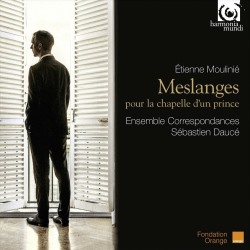
|
Étienne MOULINIÉ (1599-1676)
Meslanges pour la Chapelle de Gaston d’Orléans
O bone Jesu [1.52]
Lauda Sion salvatorem [1.43]
Caro mea vere est cibus [2.21];
Cantate Domino [3.05]
O bone Jesu [1.50]
Magi videntes stellam [3.49]
O dulce nomen [2.56]
Ecce video [1.50]
Ne remiscaris Domine [3.39]
Ego flos campi [2.30]
Dum esset rex [1.20]
Veni sponsa mea [5.40]
O salutaris hostia [1.37]
Flores apparuerunt [3.03]
Litanies de la Vierge [10.50]
Antoine BOËSSET (1586-1643)
Jesu nostra redemption [3.27]
Popule meus quid fecit tibi & Pie Jesu [9.48]
François de CHANCY (c.1600-1656)
Allemandes (en sol, en ut) [4.01]
Louis CONSTANTIN (c.1585-1657)
La Pacifique [2.37]
Ensemble Correspondances/Sébastian Daucé
rec. February 2014, Temple Lanterne, Lyon, France.
HARMONIA MUNDI HMC902194 [66.10]
As you listen to this lovely music it quickly becomes apparent that Moulinié is an early baroque composer as opposed to a renaissance one. The style is clearly in process of moving towards Henri Du Mont and André Campra. I say this with a certain surprise in that Moulinié's dates almost correspond with those of Thomas Tomkins in England. Tomkins, it should be said, was somewhat conservative. Perhaps William Lawes (1602-1645) is a better comparator but on the Continent it could be Schütz (1585-1672). I hope that this helps to put Moulinié into context.
There is something approaching theatricality about some of these short motets and this reminds us that the burgeoning opera art-form was becoming popular in France at this time. This is the sort of music that Pelham Humphrey (1647-1674) was so passionate about and which he brought back to the court of Charles II.
Moulinié worked for Duke Gaston of Orléans, brother of King Louis XIII. The Duke, being somewhat rebellious, was forced to retire from the court by Louis XIV and moved his entire entourage to Blois. Moulinié went as well, at least for a while, and dedicated his collection Meslanges de sujets chrétiens to the Duke’s long suffering wife Marguérite de Lorraine. It was eventually to be published in 1658.
Thirty-six miscellaneous pieces are to be found consisting of what the composer called ‘Christian subjects’. These are cast in the form of canticles, motets and litanies. The Ensemble Correspondances has recorded one ‘Litany’ - the longest piece on the CD and eleven motets. There is also an instrumental dance item by de Chancy and two works by the little known Boësset including a very expressive setting of Popule meus quid fecit (My people how have I afflicted me), a suitable work for Passiontide and for me a real highlight. Also a new name is Louis Constantin, the name of whose work La Pacifique reminds me of the sort of title Couperin was later to employ for harpsichord solos.
The composer’s preface or ‘Avertissement’ is given in the booklet and Moulinié writes of his need to ‘purify’ music and ‘make it chaste’. It seems to me that both composer and performers do just that; indeed they could be an English choir; their voices anyway seem young and suitably flexible for this repertoire. The choir is of the size (see booklet photograph) the composer would have expected and the soloists are drawn from within its ranks. The blend with the instrumentalists is often sumptuous. The ensemble includes a variety of lutes, recorders, a theorbo and a chamber organ.
As I have mentioned, one can detect future French masters but the Venetian style is also an influence, say in the Alleluias from the Christmas motet of Magi videntes stellam. His counterpoint can almost be madrigalian as in Lauda Sion Salvatorem and it does not shrink from extreme personal profundity as in the opening track O Bone Jesu.
To sum up: this may seem to be obscure repertoire but it is significant in the overall development of the French motet which was to culminate in those huge settings by Rameau. With such cultured, sensitive and beautifully moulded performances this is a notable and delightful disc that is well worth investigating.
Gary Higginson
 |
 |
|



 All Nimbus reviews
All Nimbus reviews








